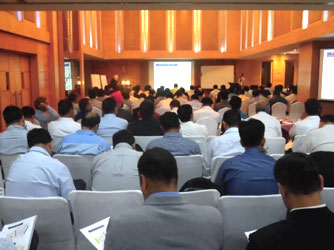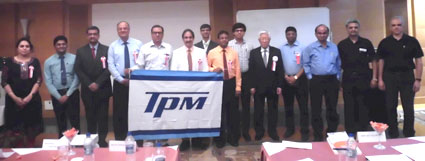Case 2 TPM Seminar in Gurgaon, India

Introduction
The Japan Institute of Plant Maintenance (JIPM) held the two-day TPM Seminar in Gurgaon, India on November 7 and 8, 2017, near the city of Delhi. This was the second event held in India, following the Lecture to Commemorate the Award for TPM Excellence in Bangalore, India in May 2016. On the first day a lecture was given by a TPM Award assessor, and on the second day TPM Award acceptance lectures were given. JIPM also held an overseas TPM event in Bangkok, Thailand, in February of this year.
Figure 1 TPM Award winners from 2011 to 2016 by country (excluding Japan)
| Rank | Country | Number of awards |
|---|---|---|
| 1 | India | 142 |
| 2 | Thailand | 108 |
| 3 | China | 35 |
As companies move further overseas, the TPM Awards are also expanding worldwide. In 2016, 90 overseas business sites were presented with awards. Over the six year period from 2011 to 2016, 142 businesses in India received TPM Awards. India has received the highest number of awards of any country other than Japan, and most of the award recipients have been local or non-Japanese companies (Figure 1). Compared to Japan, in other countries, such as India, it is rare for companies to have the opportunity to learn about the activities and results of other companies. Following on from last year’s event, JIPM held this event to create further momentum for TPM and improvement activities in India and nearby countries.
Lecture by TPM Awards assessor (Day 1)
On the first day, a TPM Awards assessor gave a lecture with the theme of “Challenge to Higher TPM Awards through Integration of TPM and TPS/Lean.” The audience was diverse, consisting primarily of management and executive level personnel from previous TPM Award-winning business sites, as well as TPM promotion bureau members and worksite leaders. The lecture’s key concepts included “the evolution and deepening of TPM,” “Process Flow Diagrams (PFDs) for achieving TPM + TPS,” and “coordination between the three types of maintenance and development management.” There were lively Q&A sessions and exchanges of opinions during each unit, and the enthusiasm of Indian companies towards absorbing new knowledge was evident.
Figure 2 Lecturing companies
| Lecturing Company | Main Products |
|---|---|
| Indian Oil Corporation Limited (Category A: 2016) |
Oil refining |
| Sona Koyo Steering Systems Ltd. (Category A: 2016) |
Automotive parts manufacturing |
| BADVE ENGINEERING LTD (Consistent TPM Commitment: 2016) |
Automotive parts manufacturing |
| HERO MOTOCORP LTD (Consistent TPM Commitment: 2016) |
Motorcycle manufacturing |
| Toyota Kirloskar Auto Parts Pvt. Ltd. (Category A: 2015) |
Automotive parts manufacturing |
| BAJAJ AUTO LIMITED. (Special Award, Consistent TPM Commitment: 2015) |
Motorcycle manufacturing |
TPM Award acceptance lectures (Day 2)
On the second day, six Indian companies gave TPM Award acceptance lectures (Figure 2). All six companies were top Indian companies, selected as winners of the Special Award for TPM Achievement, the Award for Excellence in Consistent TPM Commitment, and the Award for TPM Excellence, Category A. Their lectures presented numerous examples of activities at different stages, as well as reporting on results indicators such as KMI, KPI, and KAI. Two of the companies that gave lectures were Japanese-based. Toyota Kirloskar Auto Parts Pvt. Ltd. (Toyota Motor Corporation overseas subsidiary, 2015 Category A award recipient) achieved results through the participation of all members in the three pillar activities of standard operation, processing point management, and autonomous maintenance activities, as well as expert maintenance and quality maintenance activities. Sona Koyo Steering Systems Ltd. (JTEKT overseas subsidiary, 2016 Category A award recipient) introduced TPM activities in 2010, and had been carrying out activities steadfastly rooted in the fundamentals with the goals of zero accidents, zero defects, and zero failures. Lecturers and audience members also engaged in vigorous discussion on the second day of the event, continuing through the lunch break. The note-taking by many members of the audience provided a glimpse of their desire to learn all they could and apply what they learned to TPM activities in their own companies. Following the lectures was an introduction of the Monodzukuri Test (English Version), which has been offered since November. Many participants inquired about the test. Please see this journal or the JIPM website for details regarding the test.
Conclusion
118 people participated on the first day and 90 on the second day, and we are confident that the two-day TPM event provided participants with examples of measures for being selected as TPM Award and Higher TPM Award recipients. In their questionnaire answers, many participants requested that the event be held on a continuing basis. We will continue, especially in India and Thailand, to provide opportunities to gain insights regarding the winning of awards, to promote Japanese-style “Monodzukuri” manufacturing and TPM among local operators, and to learn about leading TPM activities by other companies.

